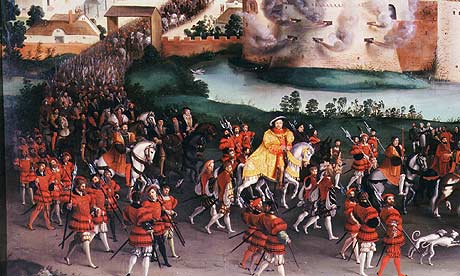
An epic, wrote Ezra Pound, is "a poem containing history". It's a neat enough definition – and, as such, open to argument. For one thing, you don't have to set out to write an epic if you want your poems to "contain" history; plenty of poets have contrived to handle historical subject matter on a more modest scale.
Some poets turn to primary historical sources as material for their works. Charles Reznikoff was a frequent miner of the records to make poems that showed history from the viewpoint of the common people: his poem "New Nation" is a typically ground-level view of the emergence of the United States.
New Nation makes me think of Robert Lowell's "The Quaker Graveyard in Nantucket", another poem in which history is viewed from the bottom up. Indeed, in Lowell's poem, the lives of the whalers are not only a map of history, they take on almost mythic status.
Not all poets are on the side of the little people; some are even more conventional history-makers themselves. It is, for instance, tempting to read Elizabeth I's "The Doubt of Future Foes" as an almost unique blend of historical commentary and personal lyric by the prime mover of the events alluded to. I say "almost unique" because many poets who held less exalted public positions also wrote meditations on the historic times they found themselves living through. For all their differences of style, this is equally true of a poem like Yeats's "Easter 1916" and "A Dialogue between Old England and New" by Anne Bradstreet.
Both Yeats and Elizabeth I blur the lines between the personal and the historic to the point where it is not really possible to distinguish them clearly. This is taken even further by Diane Wakoski in her poem "The Father of My Country". Here the history is personal, and the personal is historic.
Of course, poets have been quick to point out the lessons of history, even if they do not always agree what those lessons are. In his long, meditative poem, "A Drunk Man Looks at the Thistle", Hugh MacDiarmid seems to be saying that his beloved, infuriating Scotland is trapped in a cycle of repeated mistakes; the lesson of history is that people fail to learn from it. In "Love Among the Ruins", Robert Browning reminds us that history is the story of the rise and fall of civilisations; not even the most powerful can expect to endure. Unsurprisingly, these pessimistic views of the march of time are not shared by the Knight of the White Elephant of Burmah, William McGonagall, whose "The Battle of Omdurman" is a paean to the British army on their historic mission "to establish what's right wherever they go".
And so, this month's challenge is to write a poem on the theme of history. You may choose to write from the perspective of the most ordinary woman in the street or the most powerful leader, on events from history ancient or modern, or none of the above. The one stipulation is to produce a poem containing history, however you may wish to define it. Footnotes and lists of sources are strictly optional.

